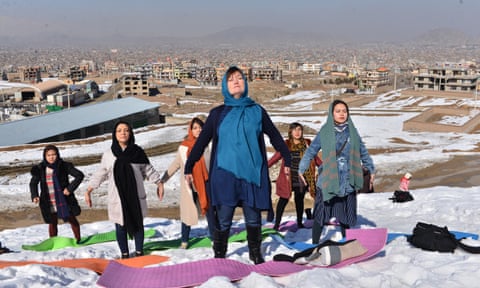In 2018, less than a quarter of photographs published in major media outlets were taken by female photojournalists. Women by Women aims to demonstrate the importance of showing diverse perspectives in photography; female as well as male; local as well as international, and how different the world can look as a result.
Putting this brief in the hands of local female photographers, the series starts in Kabul, Afghanistan, with the stories of a kickboxer, politician, street artist, yoga teacher, fashion designer and drugs counsellor. They are all breaking down gender barriers and shattering stereotypes in different ways, in one of the most dangerous countries in the world for women.
“Being a woman photographer is a very big challenge in Afghanistan. If men see you with a camera, they are shocked; they think ‘how can a woman be doing photography?’” says the photographer Tahmina Saleem.
The struggles Saleem describes are mirrored by the women featured in the photos. Laila Haidari, for example, who runs the only private drug rehabilitation centre in the city, was married off to a man much older than her when she was just 12 and was forced to study in secret. After she managed to get divorced, she got a job running a restaurant and shoe shop in order to fund her dream of helping drug addicts in the city.
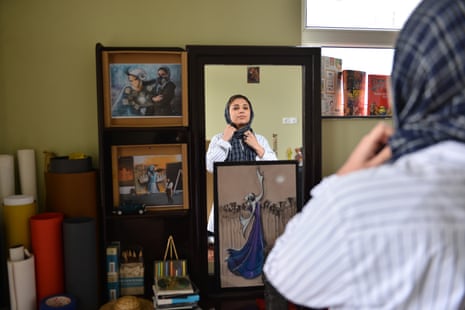
Shamsia Hassani | Street artist
A street artist, fine arts lecturer and professor of sculpture at Kabul University, Shamsia was born as a refugee in Tehran, Iran, in 1988. She showed a passion for painting from a young age, but was not allowed to study art at school due to her Afghan nationality. When she returned to Afghanistan in 2005, she decided to explore ways of using art to cover up the negative physical reminders of war.
Hassani says: “I am from Afghanistan, a country famous for war. Let’s change the topic, let’s bring peace with art.”
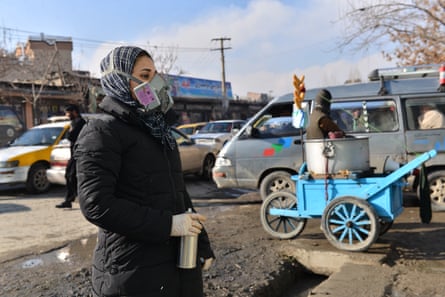
Shamsia Hassani works on her latest mural on an exterior wall of the office of the Afghanistan Photographers Association in Kabul.
“I want my art to live with people and become part of their daily lives. I want to show my art to those who have no access to visit galleries and exhibitions. My artworks are more focused on individuals and social issues, but at times they get political.
“My paintings have a character. Since women have more restrictions than men in our society, I choose my character to be a woman. A woman with shut eyes and no mouth, with a deformed musical instrument which gives her the ability and confidence to play her voice powerfully. Her shut eyes believe that there is nothing good to see, she wishes to ignore everything, to feel less sorrow.”

One of the challenges Hassani faces in Kabul is finding wall space where she is allowed to complete her spray-painted works. For this shoot, the photographer organised for Hassani to paint the exterior of the office of the Afghanistan Photographers Association. Some of the equipment she used, such as the protective face mask, are impossible to find in Kabul and so she had to purchase them from overseas. She also uses the mask to help obscure her identity.
She says: “When people see me outside doing graffiti, they say bad words, they curse and some call it a sin. People in Afghanistan are not against art, but against women doing [such] activities.”

Rahiba Rahimi | Fashion designer
Rahiba Rahimi in her tailor’s workshop.
Fashion designer Rahiba Rahimi is the president of Laman Clothing in Kabul. In 2015, the then 22-year-old political science student created the fashion label with her brother, Haseeb Rahimi, and the fashion designer Khalid Wardak. They sought to pioneer a modern style of clothing, reviving Afghan’s traditional embroidery. The brand name Laman is the Pashto word for skirt.
Both Haseeb and Wardak have since moved on to new ventures, and Rahimi now heads up a team of more than 30 employees at the Laman showroom, in Taimani square, in north-east Kabul. These include a number of women to do the intricate embroidery, some of whom work from home, which can be crucial for women from conservative families who may not be able to leave the home to work every day.

Rahiba Rahimi in her workshop. The male tailors work in one room making item’s for the men’s range, such as coats, while the women work in another workshop on dresses and tops.
The price of Laman’s dresses start at around £20, with more elaborate designs costing up to £150. The clothes are colourful, but conservative in that they do not reveal any skin, or, as Rahiba describes it, “modesty with an edge”.

Laman’s first fashion show was covered by international media but sparked criticisms in Afghanistan of “westernising” its culture. Rahimi avoided using Afghan women as models, and instead involved women working at the American embassy. Still, her seamstresses received threats, and some refused to work for the brand again.
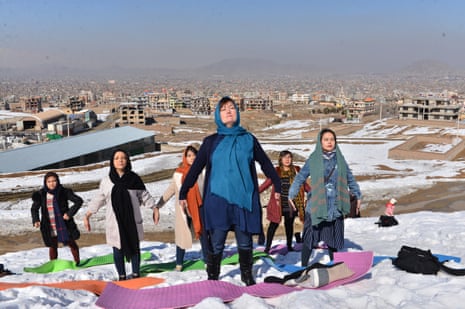
Fakhria Momtaz | Yoga teacher
Fakhria Momtaz runs a yoga class in the snow on a snowy hillside in Kabul.
Momtaz opened Kabul’s first yoga studio in 2015. Now more than 50 women come to Momtaz Yoga Centre every day. As well as yoga classes, there are also zumba, wushu and karate classes, all taught by female Afghan trainers.
Momtaz, 45, was teaching at a fitness club elsewhere in the city, where the popularity of her yoga classes grew. Supported by her husband, she openedher studio on the same premises as his web design business in Karte Char, in west Kabul. It has thrived, despite criticism that yoga is not for Muslims.

Fakhira Mamtaz runs a class at her yoga studio in Kabul.
Being in nature is an important part of her yoga philosophy, so she often takes her classes outside. She believes her students “must immerse themselves in nature and experience the changing seasons”.
Back at home, Fakhia cares for her nine-year-old daughter, Farangis, and seven-year-old twin sons, Shahryar and Shahrukh, as well as her elderly mother, Tahira. She says her husband is her strongest supporter.

Laila Haidari | Drugs counsellor
Laila Haidari is helped up from under a bridge after visiting a family to encourage them to visit Mother Camp addictions clinic.
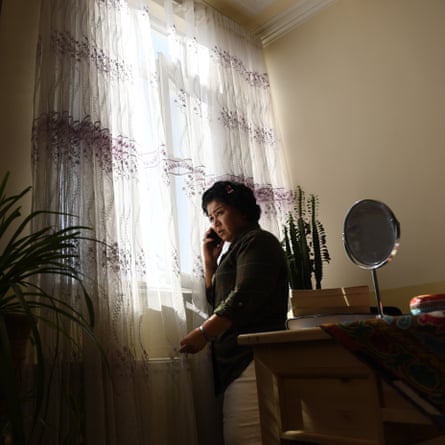

Laila Haidari at home before starting work and right, on her way to a Mother Camp centre.


Laila Haidari at a rehabilitation clinic, and right, in her cafe after a visit.
Laila Haidari, 39, established the Mother Camp rehabilitation centres nine years ago to treat a growing number of drug addicts, including her brother. So far, more than 5,000 addicts have been helped by the project.
The clinics are the only private drug rehabilitation centres in the city. Haidari partly funds the project by running some of Kabul’s most famous cafes and restaurants, as well as a shoe shop. However, she still finds it a struggle to generate enough money to sustain the vital community work.
Haidari believes passionately in education and provides scholarships to local boys and girls as well as helping with university fees. She has faced huge challenges in her work; running her own businesses in such a male-dominated country has not been easy. “I do two jobs,” she says. “The one which is my work and the other one where I fight to be able to work.”
Married off at just 12, to a man 20 years her senior, Haidari secretly studied in the evening, and eventually went to university. She divorced her husband under Islamic law and returned to her hometown of Kabul, where she found her brother struggling with heroin addiction.
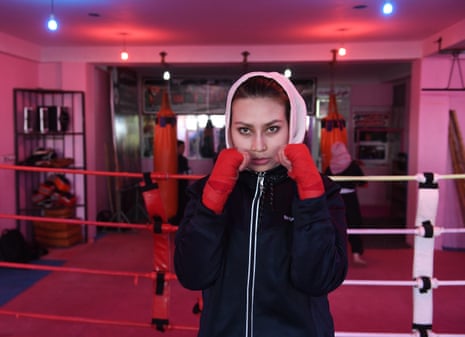
Enjila Naseri | Kickboxer
Enjila Naseri during a kowat alrami training session.
Enjila Naseri, 22, practises kowat alrami, an Arabian martial art, and is in the Afghanistan Olympics team. Kowat alrami translates as “power of throw” and is a fighting style that combines elements of boxing, kicking, holding and throwing.
Naseri was born in Iran and lived as a refugee in Iran, Pakistan and for a short time in India, before coming to her motherland of Afghanistan. She is graduating this year from law school.

Enjila Naseri celebrates her birthday with friends and family.
Naseri did gymnastics in Iran but was not able to continue after her family moved to Pakistan, where she developed an interest in kickboxing. After she came to Afghanistan, she started practising kowat alrami, and soon secured a spot on Afghanistan’s Olympics team. She has attended several national and international tournaments, winning a silver and a bronze medal.
She is also the founder of a cultural production team which showcases traditional clothing from different parts of Afghanistan, and regularly appears on national television.

Maryam Sama | Politician
Maryam Sama, 27, successfully ran as a candidate in Afghanistan’s parliamentary election in 2018, making her one of the country’s youngest MPs.
Sama left her country as a refugee to live in Iran but returned to Afghanistan after the overthrow of the Taliban regime.

Maryam Sama and her supporters counting her votes from different polling stations from across Kabul province.

Newly elected MP Maryam Sama prepares a speech before she takes her seat in the Afghan parliament.
She received 1,439 votes in the 2018 national parliamentary elections and won a seat in the Afghan parliament. In the four years before running as a candidate, she was a presenter on Tolo TV, one of the first commercial stations in the country.
Farzana Wahidy was the first professional female Afghan photojournalist to work with major international press agencies, including Agence France-Presse. She studied at the AINA Photojournalism Institute in Kabul. Tahmina Saleem is an award-winning freelance photographer with a master’s degree in visual art from Kabul University, where she was taught by the Pulitzer Prize-winning photojournalist Massoud Hossaini.
